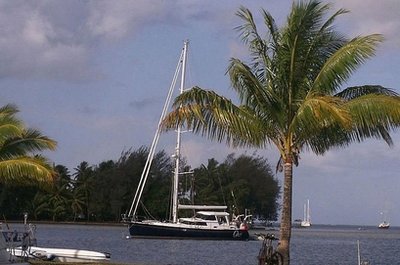 The four retired Americans slain by Somali pirates February 22 had spent the last decade giving away Bibles while sailing around the world, according to the log of their voyage.
The four retired Americans slain by Somali pirates February 22 had spent the last decade giving away Bibles while sailing around the world, according to the log of their voyage.
Scott and Jean Adam of Marina del Rey, California, and friends Phyllis Macay and Bob Riggle of Seattle, were executed when pirates fired a rocket-propelled grenade at a U.S. Navy warship, then apparently panicked as the Navy ship approached.
This is the first time in recent memory that Somali pirates have killed Americans — who they usually hold for million-dollar ransoms.
What was different this time? Was it that the 58-foot sailboat, The Quest, was packed full of Bibles?
 Jean and Scott had shared a dream through their 15 years of marriage. They wanted to retire and sail around the world while handing out Bibles to missionaries and pastors in obscure places throughout the South Pacific.
Jean and Scott had shared a dream through their 15 years of marriage. They wanted to retire and sail around the world while handing out Bibles to missionaries and pastors in obscure places throughout the South Pacific.
The purpose of their voyage, Jean Adam wrote in the voyage log was “to allow the power of the Word to transform lives.”
“Extraordinary are the times,” she wrote, “when people have been praying for Bibles for their group or their schools. When we arrive, we are often greeted by the attitude of ‘We were expecting you’ and ‘What took you so long?’
“We seek fertile ground for the Word and homes for our Bibles,” she wrote in another log entry. “Often, the ultimate homes are best found by people who are already living locally and seeking and cultivating that fertile ground.”
They enjoyed boosting the spirits of hard-working preachers and mission workers, she wrote: “We are often an amazing encouragement to folks who are long past ‘the honeymoon’ stage of their ministry.”
Their Internet log describes “over 60,000 miles of seeking homes for the Bibles. Anytime we have workers on the boat or come into the dock and have an opportunity to talk to people, we find more homes for our Bibles.”
The log tells of sailing to exotic islands most folks only dream of.
“Our mission in Fiji has been much like Tonga,” she wrote in one log entry. “We thought more remote villages would be more in need of Bibles. We appreciated the fact that our gifts are received with such great enthusiasm.”
She wrote of stopping at remote Gau Island where the native pastor carefully checked to make sure the Bibles were authentic.
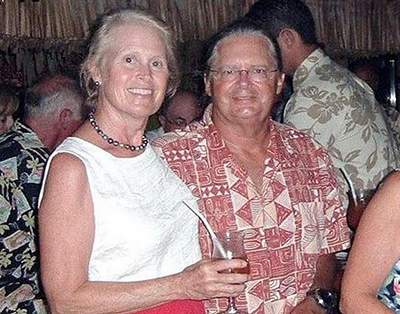 “He’s old enough to be suspect of any ‘free’ gift,” Jean wrote. “Often people have an agenda.”
“He’s old enough to be suspect of any ‘free’ gift,” Jean wrote. “Often people have an agenda.”
The couple supported themselves financially — and were not aligned with any organized outreach. “Scott and I feel that we can do more as ‘unassociated missionaries,'” she wrote. “This allows us to follow the Spirit as we search for ‘homes’ for our Bibles. We hope to be a blessing to those who receive these. This year, we shipped 17 cases of Bibles to The Quest in New Zealand for our mission (about 500 Bibles).
“We had hoped to send more, but the shipping costs were oppressive.
Jean wrote in a later entry of how “we learned last year of a schoolteacher that was selling the Bibles to parents in her school. We were so astonished that we decided to have a stamp made up. The words on the stamp are: ‘A gift from your friends in the United States. Quest Bible Ministry. NOT FOR SALE.’
“In Albert Bay, on Rabi Island, we met folks whose families came from the Kiribati Islands to the north. When we came ashore we were warmly greeted. They spoke enough English that we had a very fun time.”
“Budd Reef was our next stop. This was an atoll where we came through a very narrow slot in the reef to make it to the only anchorage just before dark.
“There’s not a lot of level ground on Vanuca Island and what there is of it has to be used for housing and planting.”
On another tiny island, she wrote: “A family of six were the only people living on Suwarrow. The closest people live almost 300 miles away upwind. With a radio that rarely has enough power to transmit their situation is often tenuous. Clearly these folks were happy to have the encouragement of the Bibles we brought and the two morning prayer services we led on Sundays.”
It was on the island of Penrhyn in the Cook Islands that the couple encountered a school principal who had been praying that someone would bring Bibles for his 50 students.
“There was not a Bible to be found anywhere at the school,” wrote Jean. “He has been praying since his arrival for these Bibles. He’s just frustrated that it took us so long to get here! In addition to Bibles we also gave some children’s literature. So all-in-all we were all pretty happy about finding Bible homes in this school!
On Samoa, Jean wrote: “Life is full of surprises! Our visit to the Seafarer’s Center in Pago Pago gave us an opportunity to get our Bibles onto container ships that have Filipino crews. Many of the people from the Philippines read English. We also found that there is a great need for Bibles in Mandarin Chinese.
On “the rather remote island of Niuatoputapu,” she told how “the Customs lady wore black. People were in mourning for a month because their King had just died.
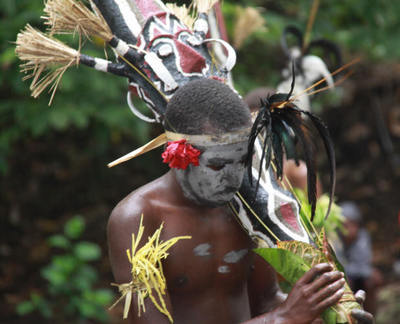 “We continued south to a little island called Uiha. When crossing the reef to get into the anchorage, our depth meter registered 11 feet or 2 1/2 feet under our keel. The village seemed deserted when we arrived because people were out harvesting produce for dinner.”
“We continued south to a little island called Uiha. When crossing the reef to get into the anchorage, our depth meter registered 11 feet or 2 1/2 feet under our keel. The village seemed deserted when we arrived because people were out harvesting produce for dinner.”
Why would the Somali pirates murder such gentle retirees? Was it because their boat was packed with Christian Bibles? “The pirates in northern Somalia are not hard-line Islamists and a yacht carrying Bibles is not likely to be a problem,” the Associated Press reported. Two Somali pirates spoke with Reuters, the British news service, by telephone. “Our colleagues called us this morning, that they were being attacked by a U.S. warship,” said a pirate who identified himself as Mohamud.
“The U.S. warship shot in the head two of my comrades who were on the deck of the yacht by the time they alerted us,” Mohamud said. “This is the time we ordered the other comrades inside yacht to react — kill the four Americans because there was no other alternative — then our line got cut.”
A U.S. Navy spokesman said after a rocket-propelled grenade was fired at one of their ships and gunfire was heard aboard The Quest, Navy Seals responded, but found all four of the retirees had been shot by their captors.
Despite attempts to save their lives, the Navy said, all four died of their wounds.
“‘We express our deepest condolences for the innocent lives callously lost aboard The Quest,‘ said General James N. Mattis, U.S. Central Command Commander. “Two pirates died during the confrontation and U.S. forces found the remains of two other pirates already dead aboard the vessel. Thirteen pirates were captured and detained, along with two already in custody. A total of 19 pirates were involved in the hijacking.
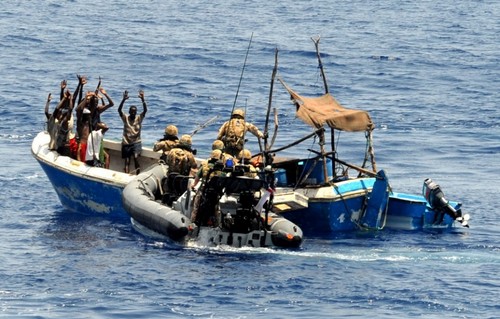 “The remains of the four Americans were taken aboard the aircraft carrier USS Enterprise, as were the 15 pirates in custody.”
“The remains of the four Americans were taken aboard the aircraft carrier USS Enterprise, as were the 15 pirates in custody.”
There is no word yet on where the pirates will be taken for trial. They could go to Kenya or they could come back to the U.S. There is a precedent for both.
Vice Admiral Mark Fox, Commander of Centcom’s Naval Forces, told Fox News there was “absolutely no warning” before the hostage situation turned deadly. “At 8 a.m. local time,” he said, “a rocket-propelled grenade was fired at the USS Sterett (one of four U.S. Naval ships monitoring the situation) from pirates on board the Quest. The shot missed, but immediately after gunfire erupted inside the cabin of the Quest.”
![]()
“‘Several pirates appeared on deck and moved up to the bow with their hands in the air in surrender. That’s when U.S. Special Operations Forces approached on small boats and boarded the yacht.
“When a Navy Seals unit reached the yacht, they found two pirates had already been killed by small-arms fire. As they went below deck, there was an exchange of fire that killed one pirate. The other pirate was killed by a Seal who used a knife in close combat,” said Vice Adm. Fox.
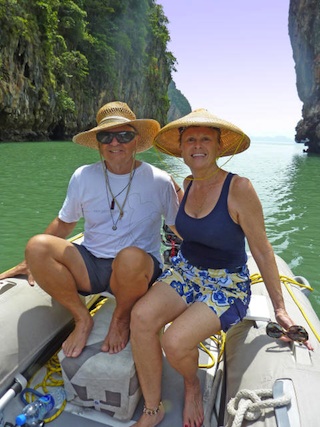 “It is with great sadness that I learned today of the killing of all the Americans on board The Quest, including my friends Jean and Scott Adam,” wrote Lynn Walford, editor of the Internet publication Wireless and Mobile News. “Scott helped people believe in themselves. He loved sailing and found a great partner in Jean to sail with him around the world. They had a mission. They shared their blessings and love wherever they went.
“It is with great sadness that I learned today of the killing of all the Americans on board The Quest, including my friends Jean and Scott Adam,” wrote Lynn Walford, editor of the Internet publication Wireless and Mobile News. “Scott helped people believe in themselves. He loved sailing and found a great partner in Jean to sail with him around the world. They had a mission. They shared their blessings and love wherever they went.
“They will be missed by us all. May you rest in peace with smooth sailing in the hereafter. Thank you, Jean and Scott for sharing your love and light with us.”
